Model Based Systems Engineering (MBSE) Online Course Training
The Step by Step Course To Master MBSE Methodology ISE & PPOOA
This is the only course where you will learn from certified experts, combining both best practice and theory.
- 20+ Hours Lessons
- Certificate of Completion
- Course is Support by a very claimed MBSE Book
- On-site Training Course
- Taught in Spanish or English.
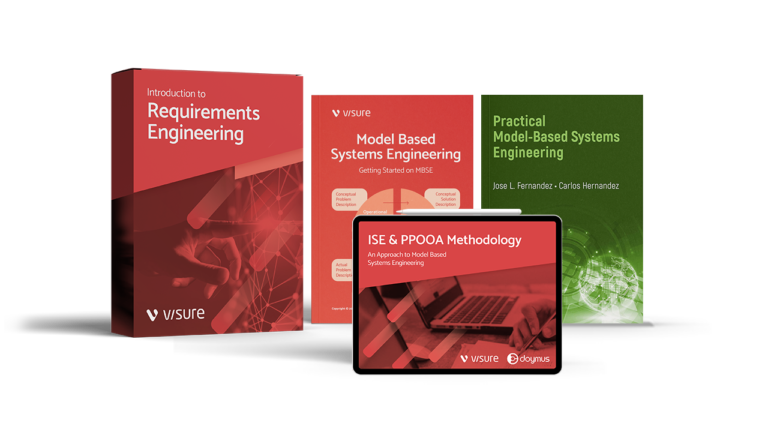
1,000+ Highly Regulated Organizations Trust Visure








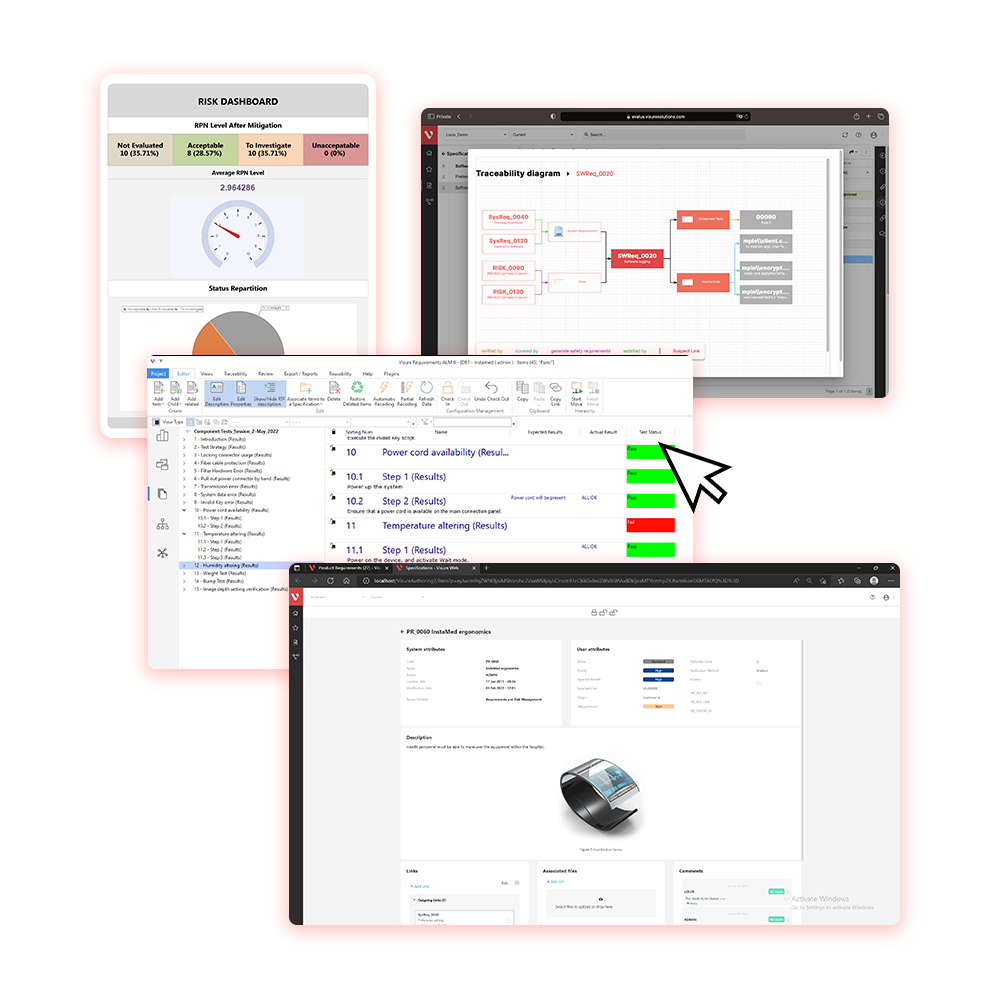
Course objetives
Train the engineer in the development of system models with standard SysML notation, using a practical approach combining MBSE and a set of good practices used in traditional systems engineering and in other engineering disciplines.
These best practices include those related to specifying needs and requirements, identifying functions and modeling functional flows using the N-square chart, modularity and physical architecture, as well as system documentation.
To improve the understanding of the attendees, exercises will be carried out in the course and an online laboratory working on an illustrative example using a commercial MBSE tool.
Training in the ISE&PPOOA methodology is not oriented towards the use of any system modeling tool in particular, as the ISE&PPOOA methodology is tool independent.
Course Methodology
The course is based on the ISE (Integrated System Engineering) & PPOOA (Processes Pipelines in Object Oriented Architectures) methodology, presented in detail in the book: Practical Model-Based Systems Engineering.
ISE & PPOOA is an architecture design methodology where there are multiple processes running concurrently in parallel and usually in real time.
The book’s author is the teacher of the course.
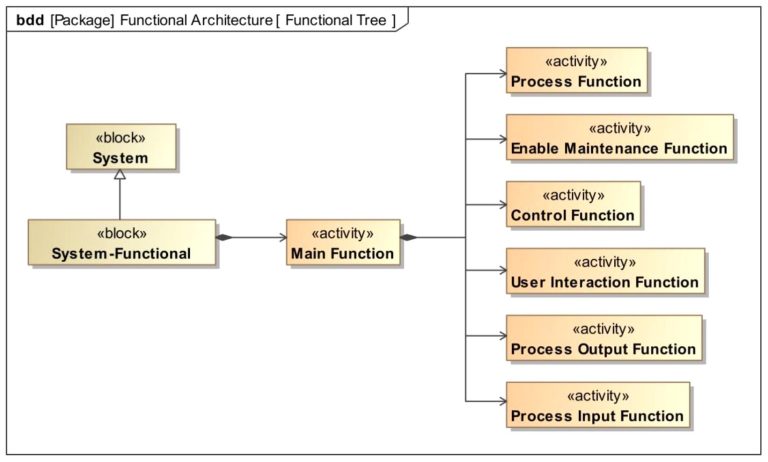
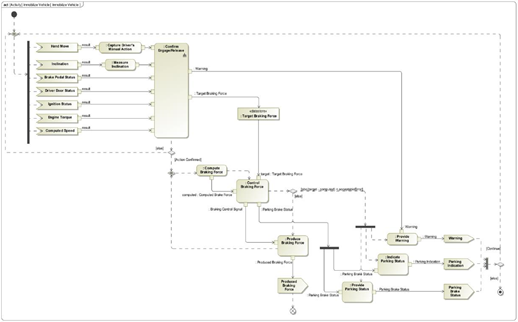
What You'll Learn
- Learn best practices related to specifying needs and requirements, identifying functions and modeling functional flows using the N-square chart, modularity and physical architecture, as well as system documentation.
- Learn about the different MBSE methodologies and processes, such as Model-Driven Development (MDD) and Systems Modeling Language (SysML)
- Understand the fundamentals of systems engineering and how they relate to the MBSE approach
- Explore the tools and platforms used to support MBSE in an enterprise environment, such as Cameo Systems Modeler
- Gain the skills and knowledge needed to effectively model, analyze, and optimize complex systems using the MBSE approach
Who Is This Course For?
This course is designed for professionals in teams building complex products and systems in regulated industries.

Functional & Business Analysts

Systems Engineers

Project Managers

Development Engineers

Quality Managers

Methodology Managers
Course Agenda
This is exactly what you will learn throughout the Model Based Systems Engineering Course
Module 0: Introduction to traditional Systems Engineering (optional)
Module 1: Introduction to MBSE and SysML notation (optional)
SESSION 1Module 2: ISE & PPOOA Methodology
SESSION 2Module 3: Mission dimension
Module 4: Functional architecture
Module 5: Physical architecture
SESSION 3Module 6: Refining the physical architecture
Module 7: Requirements engineering
Module 8: ISE & PPOOA in indutrial processes engineering (optional)
Module 9: PPOOA software architecture framework (optional)
Bonus Resources & Materials
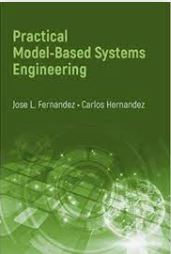
Material to be delivered and price
- Book “Practical Model-Based Systems Engineering”, Artech House, 2019. ISBN-13 : 978-1630815790
- Illustrative model worked in the online laboratory
- Slides of the training sessions
- The price is TBD per student.
- The number of attendees is limited to 15.
The Trainers
Alfonso García
Industrial engineer (UPM), CSEP
With over 15 years of experience in Systems Engineering, Alfonzo has applied his expertise to a wide range of products, including air traffic management systems (ATM), avionics, automotive, and advanced elevator systems. He assists clients in tailoring Systems Engineering processes to their specific needs and provides support in applying these processes.
As a Certified Systems Engineering Professional (CSEP) accredited by INCOSE since 2014, Alfonzo possesses extensive knowledge of Systems Engineering methodologies, both in traditional and Model-based Systems Engineering (MBSE) contexts. He has been an active member of INCOSE since 2008.
Alfonzo is dedicated to helping clients define operational concepts, develop system architectures, and conduct requirements analysis and specification to ensure successful project outcomes.

Model Based Systems Engineering, Real Time systems development, Systems Engineering Professional.

Requirements engineering, Model Based Systems Engineering, Real Time systems development, Systems and Software Engineering.
Jose Luis Fernandez
Aeronautical engineer and PhD in Computer Science (UPM)
With a background in Aeronautical Engineering and a Ph.D. in Computer Science from the Universidad Politécnica de Madrid (UPM), Jose is a distinguished independent consultant with over 30 years of experience in national and international projects.
Jose’s expertise spans various domains, including air traffic control, avionics, power generation, home automation, banking applications, mobile telecommunications services, and CASE (Computer-Aided Software Engineering) tools.
Notably, he is the creator of the ISE & PPOOA software and systems engineering methodology, recognized in the OMG MBSE (Object Management Group Model-Based Systems Engineering) wiki. Additionally, he is the primary author of the book “Practical Model-Based Systems Engineering,” published by Artech House in Norwood, MA, in 2019.
As a Senior member of IEEE, a member of PMI (Project Management Institute), and INCOSE (International Council on Systems Engineering), Jose actively participates in expert groups, contributing to the advancement of systems and software engineering practices.
Jose continues to be a prominent figure, leveraging extensive knowledge and experience to make a meaningful impact in the field of engineering and systems development.
What Top Industry Professionals Say About Our Courses
FAQs
If I'm a student, can I still register for the course?
Great question! Yes, this course is ideal for students who are aiming to join Global organizations building complex products and systems.
What does IREB & CPRE Certified mean?
IREB stands for International Requirements Engineering Board – a non-profit organization, who’s provider of the CPRE (Certified Professional for Requirements Engineering) certification scheme.
The CPRE by IREB® is a certification for everyone involved professionally with Requirements Engineering, Business Analysis and software and systems development.
Does Visure Solutions provide Corporate Trainings?
Great question! Yes, we do provide corporate trainings to organizations of any level. For more information, please visit our Contact Us Page or email us at info@visuresolutions.com.
How does the Certification work?
Once you complete the mini exams of each module within the course, you’ll be able to access the certification exam.
In order to pass the exam, you need a score greater than 70. If the score is reached, a certification will be generated by with your name and also registered within our database for validation.
Which payment methods do you accept?
We accept all payment methods, including:
- Visa
- MasterCard
- AMEX
Accelerate Your Model Based Systems Engineering Implementation with the #1 Rated MBSE Training Course
- Requirements Management
- Risk Management
- Test Management
- Requirements Quality Analyzer
- AI Integration
- Automated Compliance Checklist
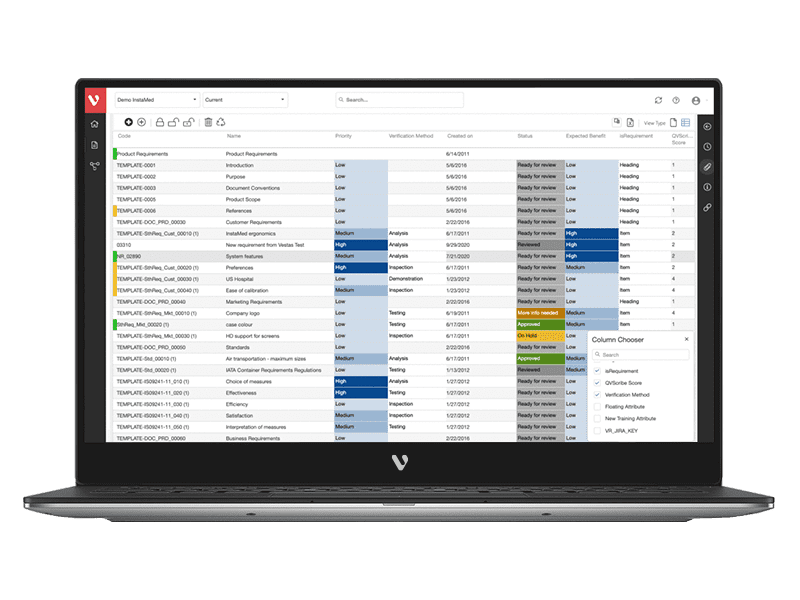
Need more information?
- On-site Training Course
- Cancel Anytime
